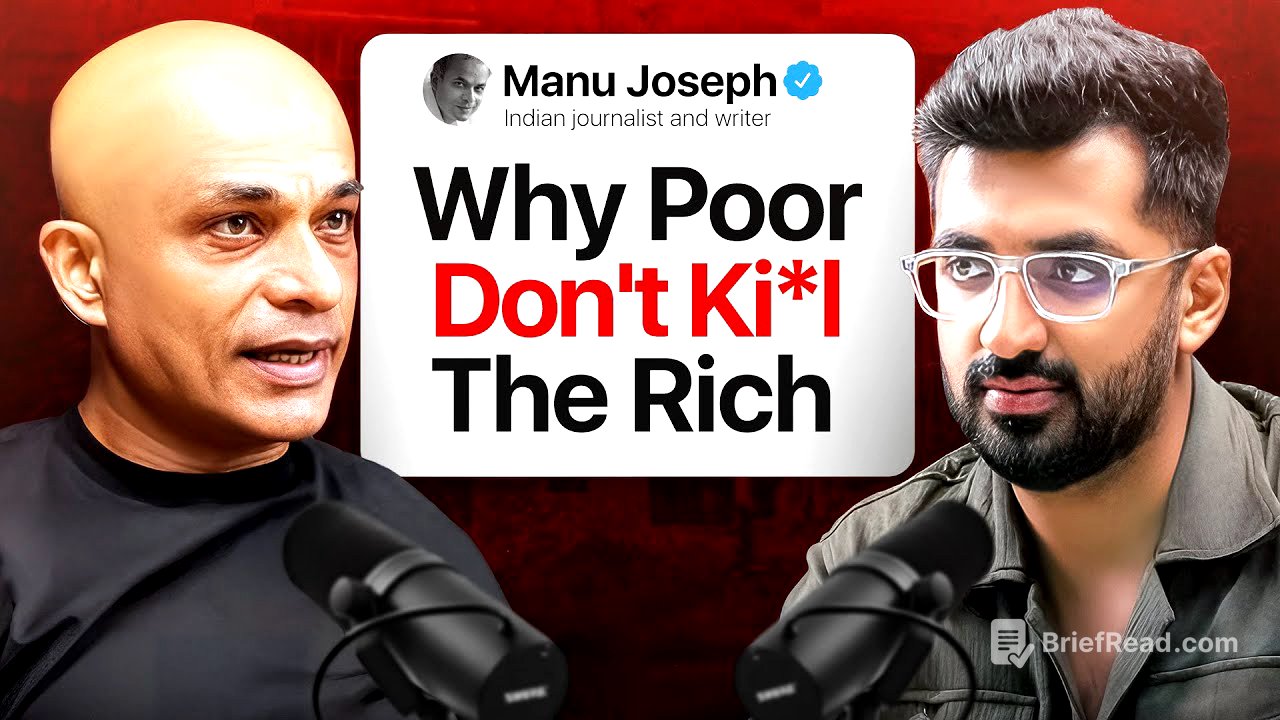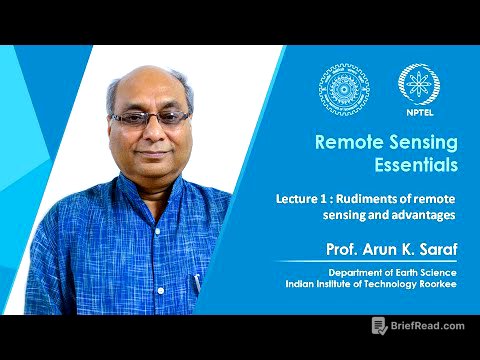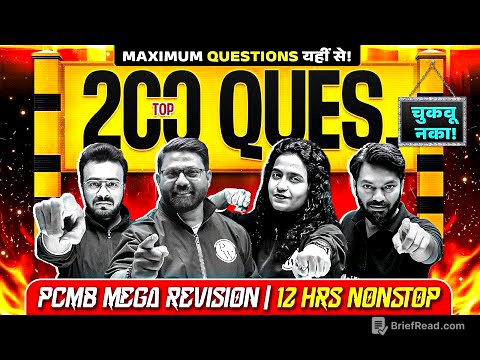TLDR;
In this Dostcast episode, Manu Joseph discusses his book, "Why the Poor Don't Kill Us," exploring the complex relationship between the rich and poor in India. He examines class dynamics, societal contradictions, and the hidden revolutions already underway. Joseph argues that the poor are not merely victims but active participants in shaping society, often in ways that the middle class fails to recognise.
- Class divisions and aspirations in India
- The role of democracy and corruption
- The impact of societal ugliness on the poor
- The changing dynamics between different classes
Looking into the life of the poor [0:00]
Manu Joseph discusses his observations as a journalist, which allowed him close access to various societal strata. He notes that the middle class in India, particularly during his upbringing, was closer to the poor. He highlights the reliance of the affluent on the services provided by the poor, describing them as subsidising the lives of the middle class. Joseph introduces the concept of "pani pilao Indians," those who expect others to fetch them water, illustrating a sense of entitlement. He emphasises that both the affluent and the poor are complicit in perpetuating this system of exploitation.
Possibility of a class uprising in the future [4:54]
Joseph suggests that a class uprising is already happening in subtle ways, such as through Indian politics. He argues that the current state of affairs is, in part, "the revenge of the poor." Democracy serves as both a safety valve and a means of retribution, as the poor often support leaders and tolerate corruption in ways that differ from middle-class expectations. He draws a parallel to Nelson Mandela's perspective, noting that the enemies of the affluent are not necessarily the enemies of the poor. The poor are exacting revenge by creating a bad civic life.
Possibility of society getting rid of class [9:05]
Joseph asserts that class distinctions will always exist due to people's aspirations to improve their status. However, he observes a shift in what people aspire to, with money taking precedence over refinement and intellectuality. He contrasts the types of people seen at luxury resorts today with those from previous decades, noting that the newly affluent share similar tastes with the poor. This shared popular culture, driven by entertainment and discourse, creates a sense of unity between the economic elite and the poor, enabling the upper class to transmit safe ideas and maintain control.
Views on Kanhaiya Kumar and how prestige works [12:30]
Joseph describes Kanhaiya Kumar as intelligent and a good speaker, suggesting that Kumar, like many others with humanities degrees, may struggle to find practical application for his knowledge outside of politics. He argues that while knowledge is valuable, many who pursue intellectual careers are actually seeking prestige, jobs, and respect. Joseph criticises the cruel nature of prestige, noting that it diminishes once the lower classes gain access to it. He uses India's moon landing as an example, suggesting it lowered the prestige of such achievements.
Why college education is complete BS [17:10]
Joseph believes that college education is often a waste of time, particularly for those from poorer backgrounds. He argues that social equity and contacts are more important than education for upward mobility. Reflecting on his own experience, he admits that he chose literature to avoid studying and that his reading habits declined during his college years due to a sense of cultural disgust.
Why not having high standards saves people from trouble [18:55]
Joseph admits he doesn't feel kinship with anyone, but sometimes feels sympathy for teenagers in college who are trying to improve their lives through debating. He observes that most people do not have high standards for themselves, which protects them from trauma. While many in poor communities accept their circumstances, some individuals aspire to more, leading to misery but also the potential for success. He dismisses the term "climbers" as a derogatory label used by the upper class for those with aspirations.
Accepting deaths and tragedies in poor communities [26:05]
Joseph discusses the meekness and acceptance of tragedy often seen among the poor in India. He references the story of Dana Maji, who walked 42 kilometres carrying his wife's body because he couldn't afford a hearse. Joseph interprets this behaviour as a reflection of the poor being "centuries behind" in their mindset. He recounts his experience covering the Gujarat earthquake, where he observed people behaving in ways that seemed medieval due to the scale of death and devastation.
Simplistic and romanticized notions of the poor [32:35]
Joseph criticises the simplistic and romanticised views some people have of the poor, often portraying them as simple, primitive, and happy. He points out that the poor are also capable of violence and crime. He suggests that this romantic view may stem from a lack of considering the poor as equals and a need to compensate for the vast differences in fortune.
Change in this generation [34:55]
Joseph notes that the younger middle class wants to be nicer to their servants but doesn't want to abolish the system of servitude. He observes that this generation aims to be better than their parents, adopting practices like saying "hello" and "thank you." However, he believes that the depth of poverty is so profound that superficial gestures are insufficient. He also observes that the American middle class is becoming "Indianised" by employing servants, reflecting a global shift.
The " Filipino maid" story of Delhi [38:22]
Joseph mentions the phenomenon of Filipino maids in affluent areas like Dubai, noting their well-turned-out appearance. He recounts an anecdote about a Delhi family who had a Filipino maid, which caused social unease because she looked better than the "aunties." He highlights the Indian middle class's concern with ensuring their maids look clearly distinguishable from themselves.
Problems of the Indian middle class [40:59]
Joseph discusses the Indian middle class's tendency to hide the poor from view, forcing them into the shadows to avoid disrupting the aesthetic of their surroundings. He mentions a building in Bandra with a small, slow elevator designated for maids and delivery personnel. He argues that the middle class has created colonies that are islands, escaping the realities of India but still relying on the poor for services.
Ugliness of public spaces in India [45:18]
Joseph argues that the municipal ugliness of India, along with its street chaos and civic disorder, paradoxically reassures the poor that they have not been left behind. He contrasts this with Western countries, where public spaces are shared across classes. He believes that India manages to look poorer than it is, and that this ugliness unconsciously provides consolation to the poor.
The poor are the worst enemies of the poor [51:33]
Joseph asserts that the poor are often the worst enemies of each other, as they compete for limited resources. He illustrates this with examples such as AC mechanics from different regions undercutting each other and housemaids facing harassment from security guards. He argues that while the affluent may be theoretical villains, the real tormentors of the poor are often within their own community.
Behavior of people with land [55:52]
Joseph discusses the behaviour of people with land, noting that they often exhibit a different attitude compared to those without. He shares an anecdote about a driver from Faridabad who constantly asserted his status as a Brahmin Nambardar, highlighting the self-assuredness that comes with land ownership. He explains that those who do lowly jobs but possess land often have a different demeanour due to their financial security.
Man-woke conflict [1:01:05]
Joseph defines a "woke" man as someone trying to appropriate issues that naturally come to progressive women, often resulting in exaggerated and insincere behaviour. Despite this, he acknowledges that woke men can be useful ambassadors for the poor by projecting an image of upper-class decency. He also notes that politicians, often from rural backgrounds, can be more courageous in speaking on behalf of the poor.
Biometrics for Aadhaar vs. US Visa [1:06:30]
Joseph criticises the paranoia surrounding Aadhaar, particularly the objections to providing biometric data to the Indian government. He contrasts this with the willingness of the same people to provide biometrics to the US government for a visa. He argues that politicians saved Aadhaar from amateur activists with foolish notions about privacy.
Indians at a 5-star buffet [1:12:32]
Joseph describes the behaviour of Indians at five-star buffets, where they often lose all social grace and become like "cows grazing." He notes that the lavishness of Indian buffets is meant to convey that the hotel has made a loss, and that a significant amount of food is wasted. He observes that the new service staff, coming from deeper parts of India, are often shocked by this display of arrogance.
Difference between old money and new money [1:20:17]
Joseph distinguishes between old money and new money, using Ratan Tata as an example of the former. He argues that old money individuals often lack predators and move through life with a certain innocence, while new money individuals have a different view of people due to their struggles. He suggests that old money can also be a form of poverty if they are unable to keep up with the changing standards of wealth.
What led him to write this book [1:32:10]
Joseph explains that the idea for the book originated from one of his old columns. He admits that he hadn't written a book in eight years due to the financial incentives of screenwriting. He acknowledges that the book has limited market potential outside India, but he felt it was important to connect with his primary audience.
Why don’t the poor kill us? [1:34:24]
Joseph encourages viewers to read the book to find out why the poor don't kill us. He urges readers to support the book, emphasising that it needs extra love and attention.
Conclusion [1:35:57]
The interviewer thanks Manu Joseph for his time and recommends the book to viewers, highlighting its caustic opinions and insightful observations on the disparities between the rich and poor in India.









